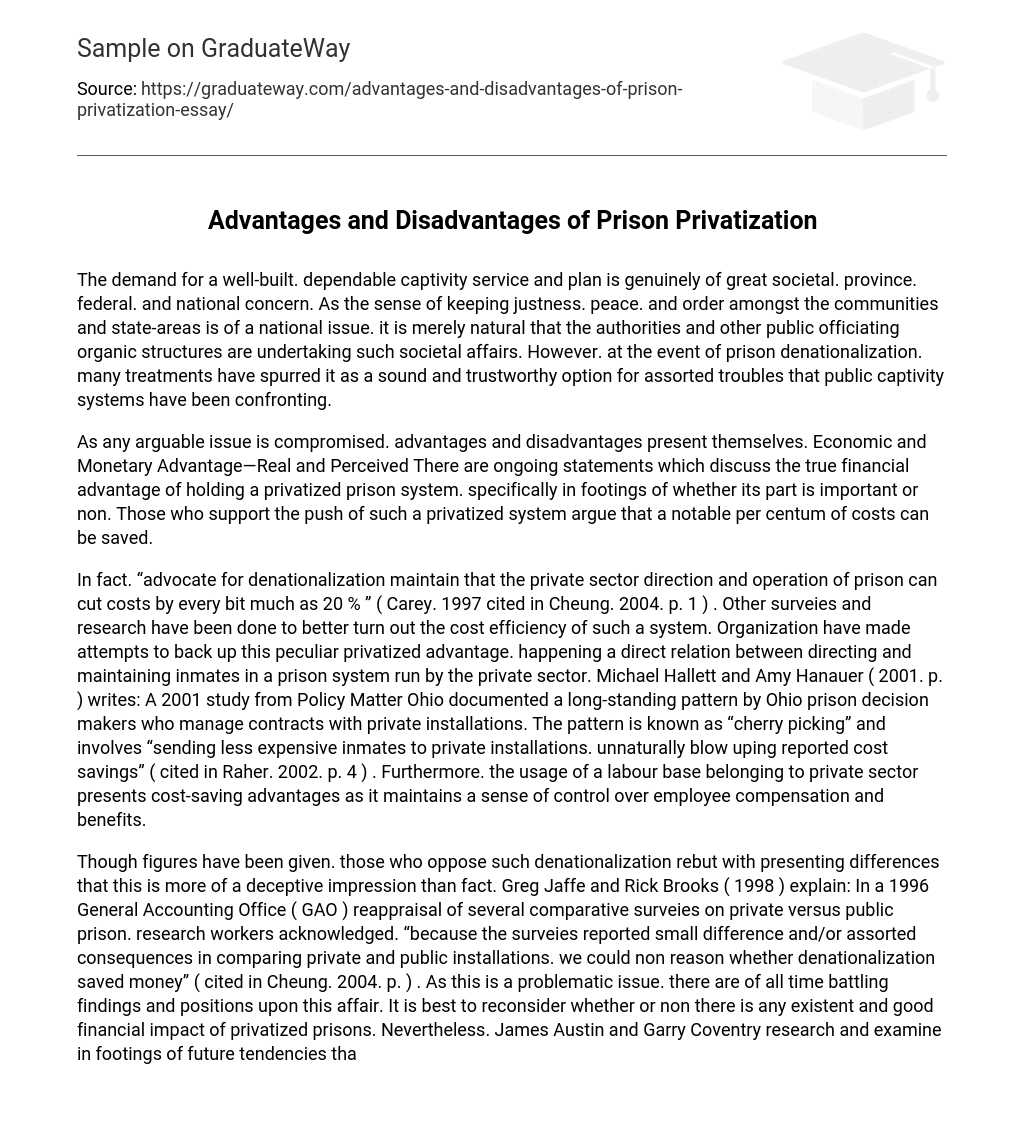The demand for a well-built. dependable captivity service and plan is genuinely of great societal. province. federal. and national concern. As the sense of keeping justness. peace. and order amongst the communities and state-areas is of a national issue. it is merely natural that the authorities and other public officiating organic structures are undertaking such societal affairs. However. at the event of prison denationalization. many treatments have spurred it as a sound and trustworthy option for assorted troubles that public captivity systems have been confronting.
As any arguable issue is compromised. advantages and disadvantages present themselves. Economic and Monetary Advantage—Real and Perceived There are ongoing statements which discuss the true financial advantage of holding a privatized prison system. specifically in footings of whether its part is important or non. Those who support the push of such a privatized system argue that a notable per centum of costs can be saved.
In fact. “advocate for denationalization maintain that the private sector direction and operation of prison can cut costs by every bit much as 20 % ” ( Carey. 1997 cited in Cheung. 2004. p. 1 ) . Other surveies and research have been done to better turn out the cost efficiency of such a system. Organization have made attempts to back up this peculiar privatized advantage. happening a direct relation between directing and maintaining inmates in a prison system run by the private sector. Michael Hallett and Amy Hanauer ( 2001. p. ) writes: A 2001 study from Policy Matter Ohio documented a long-standing pattern by Ohio prison decision makers who manage contracts with private installations. The pattern is known as “cherry picking” and involves “sending less expensive inmates to private installations. unnaturally blow uping reported cost savings” ( cited in Raher. 2002. p. 4 ) . Furthermore. the usage of a labour base belonging to private sector presents cost-saving advantages as it maintains a sense of control over employee compensation and benefits.
Though figures have been given. those who oppose such denationalization rebut with presenting differences that this is more of a deceptive impression than fact. Greg Jaffe and Rick Brooks ( 1998 ) explain: In a 1996 General Accounting Office ( GAO ) reappraisal of several comparative surveies on private versus public prison. research workers acknowledged. “because the surveies reported small difference and/or assorted consequences in comparing private and public installations. we could non reason whether denationalization saved money” ( cited in Cheung. 2004. p. ) . As this is a problematic issue. there are of all time battling findings and positions upon this affair. It is best to reconsider whether or non there is any existent and good financial impact of privatized prisons. Nevertheless. James Austin and Garry Coventry research and examine in footings of future tendencies that “a figure of companies runing privatized prisons is likely to diminish as competition and costs of making concern addition. therefore coercing a consolidation of houses within the industry” ( Austin & A ; Coventry. 2001. p. eleven ) .
Hence. the logic of showing a privatized prison system. a apparently cost-efficient option. still holds job. Therefore. this does non truly address solutions to replace to the full the traditional. non-privatized. prison system. Quality Process of a Privatized Operation—Safety and Reliability The treatment of quality and dependability of a privatized prison system service and its standing to last pressing conditions of what prison and its inmates demand is of valuable concern more than anything else. Apparently. nevertheless. prison in a privatized sector is non an ideal tantrum.
There are issues of safety. for the inmates. guards and public. that inquiries these. Again. James Austin. and Garry Coventry besides examines that physical assaults on guards and staff by inmates were about more significantly perennial in private prisons than in government-run prisons and physical assaults on fellow inmates were more significantly perennial in private prisons ( Austin & A ; Coventry. 2001 ) . Hence. with the miscellaneous dangers of a privatized system. it so places its unity on rickety land. Sentencing Policy and Net income Motivation
It seems that the correlativity of the sentencing policy and net income motivation is in line with each other at a prison belonging to the private sector. Since net income maximization is the chief aim of a private-based organisation. it would look logical to tip the graduated tables of condemning towards the private prison’s benefit. showing the possible usage of profitable unfairness with conditions that may go against peculiar prison Torahs and captive rights. This presents a disadvantage more over the witting attempt to exert the true kernel of human justness.
Puting the promise of net income in front of justness is a signifier of corruptness that disrupts the natural manus of the supposed trustiness of a true and indifferent justness system. Furthermore. Amy Cheung ( 2004 ) adds: “And because most private prisons operate on a per diem rate for each bed filled. there is a fiscal inducement non merely to confine more inmates more inmates but besides to confine them for a longer period of time” ( p. 4 ) . Lack of Public Oversight With the privatized prison system. the populace is freed from paying revenue enhancements that are allocated to keep and guarantee a dependable prison system.
However. as revenue enhancement freedoms are placed. the public ability of inadvertence in footings of O.K.ing and disapproving upon issues of new prison installations amongst communities. etc. is sacrificed. Conclusion Prison denationalization has both advantages and disadvantages that hold cardinal elements for argument. However. what must be prioritized is the valuable function of the justness system and the ability of a reliable prison system. whether private. public. or assorted. to render the manus of true justness.





